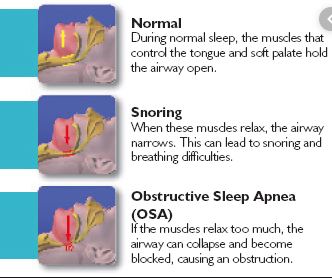What Is The Difference Between Snoring And Apnea?
Difference Between Snoring And Apnea is that Snoring is the sound that is produced when the breath is partially obstructed in some way while sleeping. On the other hand, apnea is a stop or total suspension of breathing for a few seconds due to complete obstruction of the air duct.
Snoring is just an abnormal sound while apnea becomes a sleep disorder. Snoring is an alarming symptom that indicates that the patient may be suffering from sleep apnea, but not all people who snore suffer from sleep apnea.
Snoring occurs when air passes through the muscles and tissues around the throat when relaxed, causing the tissues to vibrate creating the particular sound of snoring, which can be very irritating.
When snoring, the sound is often produced on the soft palate. Snoring during sleep is the first sign that indicates the possible existence of obstructive sleep apnea. In general, the structures involved in snoring are the uvula and the soft palate.
Irregular air flow is usually due to airway obstruction due to certain reasons, such as nasal obstruction due to polyps, deviated septum, weakness of the throat muscles (which causes the throat to close during sleep), a badly positioned jaw,
Obstructive sleep apnea occurs when soft tissues in the throat collapse and block the airways, which usually happens several times during sleep.
When sleeping, these muscles relax and the tongue falls back into the airway tract, impeding the entry of air and stopping breathing. This is known as apnea; It is temporary and can last for 10 seconds or even longer, until the brain detects that oxygen levels have dropped too low causing the person to wake up. In sleep apnea, this cycle is repeated several times.
The person wakes up, breathes normally, the cycle reverses and falls asleep again. Most people with sleep apnea snore loudly with periods of silence, when the air flow is reduced or blocked.
Snoring is usually annoying for the couple and people who sleep nearby. Most people in the mid-40s snore, the most common reason is obesity.
Not all snoring patients suffer from any disease; However, loud snoring is associated with the development of carotid artery atherosclerosis, risk of brain damage and stroke.
The most common symptoms observed in obstructive sleep apnea are excessive daytime sleepiness due to discontinuity of sleep at night, anxiety, depression, lack of concentration, irritability, lack of memory, changes in mood, pains morning head and decreased interest in sex.
The diagnosis is usually made based on the medical history and examination by the doctor. The diagnostic test called sleep study or polysomnography is done in sleep centers or at home when the patient is asleep. This test measures respiratory activity, brain activity, heart rate and blood pressure.
The treatment of snoring generally involves the modification of lifestyle, that is to lose weight in the case of obese people, avoid alcohol and smoking, avoid sedatives and sleep on your side.
If a patient suffers from sleep apnea, then the treatment is the use of a continuous positive pressure machine in the airway, in which the person sleeps with a mask over the mouth and nose and the air is forced to pass through the upper airway through a blower, as we can see in the photo below.
The pressure is adjusted to maintain the level of oxygen in the blood. Surgery is the last option if adenoids or tonsils are the cause of the obstruction or oral surgery if the badly positioned jaw is the cause.
Conclusion: Snoring is a noise produced due to airway obstruction, while sleep apnea is a respiratory disorder. Snoring can be a symptom that indicates the possibility of having sleep apnea. Snoring occurs due to partial obstruction of the airways, while apnea is completely obstructed. Snoring increases the risk of coronary atherosclerosis in the long term. Both snoring and sleep apnea are treatable
You May Also Interested:
- What Is The Difference Between Chronic Bronchitis And Emphysema?
- What Is The Difference Between Cycling And Spinning?
- What is the Difference Between Gray and White Matter?
- What is the Difference Between Bacterial and Viral Meningitis?
- What is the Difference Between Hypothermia and Pneumonia?
